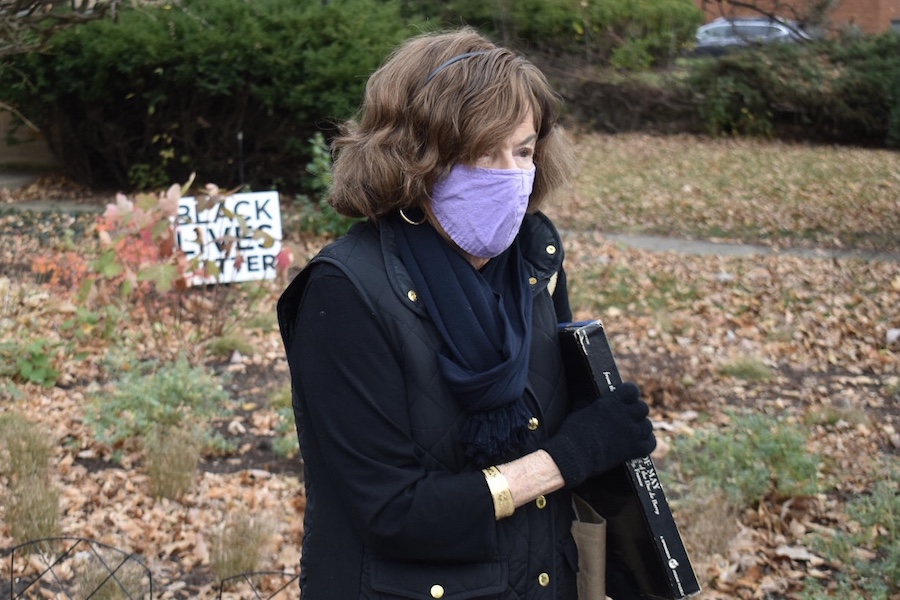Evanston Fight for Black Lives launches sit-in series to defund EPD
Maia Spoto/Daily Senior Staffer
Ald. Ann Rainey (8th) addresses protesters. Evanston Fight for Black Lives held a sit-in at Rainey’s house Saturday to demand Rainey vote against the city’s proposed 2021 budget and commit to defunding Evanston Police Department by 75 percent.
November 16, 2020
Organizers from Evanston Fight for Black Lives held a sit-in in front of Ald. Ann Rainey’s (8th) house on Saturday, demanding that she vote against the city’s proposed 2021 budget and commit to defunding Evanston Police Department by 75 percent.
“The longer you wait (to defund police), the more people could potentially die from police,” EFBL organizer Maia Robinson said. “That’s why it’s urgent, and why we keep putting pressure on.”
Saturday morning marked the first of ten EFBL sit-ins. The demonstrations are an effort to pressure aldermen into voting down a budget that fails to “substantively” defund EPD and reinvest the funds into community services and alternative safety plans.
Members from Northwestern-based activist group NU Community Not Cops attended the sit-in. At Saturday’s action, EFBL organizers also demanded Rainey not seek re-election.
The proposed 2021 budget would eliminate 11 police officer positions, including four current vacancies, to save the city up to $1.8 million. Instead of reallocating the money into social services, which many local organizers are calling for, the city is cutting the funds to bridge a coronavirus-driven deficit, city manager Erika Storlie said.
The city is also allocating at least $200,000 to the Health and Human Services Department to fund an alternative emergency response plan. Some residents have expressed disappointment that program funding isn’t incorporated into EPD’s budget.
Rainey met with organizers for about 30 minutes as she was leaving to notarize her re-election papers. She later told the Daily she doesn’t believe the majority of her constituents want City Council to defund EPD. She said EPD’s budget is justified based on the force’s size, and defunding the department would endanger police pensions.
“We have a difference of opinion,” Rainey said to organizers. “I do not believe that our police department has a long history of brutalizing, and I don’t think you can compare anything in our police department with George Floyd.”
EFBL organizers said the police killing of George Floyd shouldn’t be the bar by which leaders assess racism in policing.
Additionally, they said EPD officers still traumatize and harass people, referencing recent instances of police brutality against two Black men: Lawrence Crosby in 2015 and Trent Hunt in 2020.
“The issues that are happening in our police department are part of institutional racism.” an organizer said. “You cannot change institutions built on racism with reform.”
At the end of August, EFBL organizers sent City Council a 27-page document laying out steps to defund and reallocate EPD’s budget, based in part on Chicago activists’ demands to defund Chicago police.
The document calls for the Council to reinvest 75 percent of EPD’s funding into emergency response programs focused on mental health, drug misuse and sexual and domestic violence crisis management, as well as community services like healthcare and housing.
“When you fund services that actually help people’s lives, like jobs and food and housing, the community is more close and can trust each other better,” Robinson said.
As protesters gathered in front of Rainey’s house and chalked messages like “BIPOC lives > cops” and “You serve the people. Invest in the community, not cops” on the sidewalk, some passersby encouraged them to continue their work. Others expressed hesitation about EFBL’s demands.
8th Ward resident Ed Creech said he appreciates the desire to fund social services, but worries what would happen if the city eliminated its police department. Creech said unrest related to NUCNC’s anti-policing protests leads him to worry that defunding the police would cause “chaos.”
“Police are here to protect us, and by and large, they do do that,” Creech said. “Then again, (I’m) not Black.”
On the other hand, Davidsarah Kaplan, an 8th Ward resident who attended the sit-in, said they don’t consider police interactions with the Evanston community very healthy, and that watching police clash with NUCNC protesters has made them feel uncomfortable.
Armed police in riot gear from the Northern Illinois Police Alarm System’s Mobile Field Force, a “police mutual aid” group that supplements local police departments when needed, have been assisting EPD’s responses to NUCNC protests over the past month.
Rainey told protesters City Council wasn’t notified before NIPAS showed up to a protest for the first time this fall.
“I really find it offensive that they were there, and I would encourage the chief of police not to do that again,” Rainey said. “They don’t know us. They have no business being in our town.”
EFBL members will continue sitting in outside aldermen’s houses until City Council votes on adopting the proposed 2021 budget in its Nov. 23 meeting.
Robinson, the EFBL organizer, said centuries of White supremacy have led people to believe that police abolition is impossible, but she thinks people should hold onto hope for a future without police.
“Have faith that the world can be a just place someday,” Robinson said. “It can definitely start in Evanston.”
Email: maiaspoto2023@u.northwestern.edu
Twitter: @maia_spoto
Related Stories:
— The Women Behind Evanston Fight For Black Lives
— Evanston Fight for Black Lives decries police violence in statement about Saturday NUCNC protest
— Defining Safe: Defining the Outside Agitator



